30 oct 2015

The Egyptian army on Thursday evening embarked once again on flooding the Palestinian side of the Rafah border area with large amounts of seawater in order to destroy tunnels used for smuggling goods into the besieged Gaza Strip.
The Palestinian interior ministry affirmed on its website that the Egyptian army started yesterday evening to pump another torrent of seawater underground in Rafah, particularly in al-Salam neighborhood and east of the Rafah border crossing to destroy tunnels.
The Egyptian army had started last September to pump water from the Mediterranean Sea into the tunnels through large underground holed pipes at the pretext of preventing smuggling into the impoverished enclave.
The Egyptian measure would have a serious and disastrous impacts on the agricultural soil, the aquifer and the environment, according to local and foreign experts.
The Palestinian interior ministry affirmed on its website that the Egyptian army started yesterday evening to pump another torrent of seawater underground in Rafah, particularly in al-Salam neighborhood and east of the Rafah border crossing to destroy tunnels.
The Egyptian army had started last September to pump water from the Mediterranean Sea into the tunnels through large underground holed pipes at the pretext of preventing smuggling into the impoverished enclave.
The Egyptian measure would have a serious and disastrous impacts on the agricultural soil, the aquifer and the environment, according to local and foreign experts.
29 oct 2015
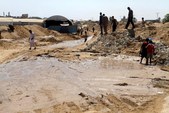
The Palestinian Legislative Council (PLC) on Wednesday slammed the Egyptian waterway project carried out along the borders with the blockaded Gaza Strip, saying it affects both Gaza’s ecosystem and the Palestine-Egypt bilateral ties.
PLC First Deputy Speaker Ahmad Bahar said the waterway project violates Palestinians’ right to live in dignity and in a healthy environment.
He drew attention to the serious damage the channel poses on the underground water and Gaza’s ecosystem, saying Rafah city is at risk of being drowned due to Egypt’s flooding of the borders with high-salinity water.
He added that such a move affects the Palestinian-Egyptian fraternity bonds both on the political and strategic levels, calling on the Egyptian authorities to immediately halt the waterway project and keep to is historic pro-Palestine position.
A report by the PLC further pointed to the serious economic repercussions of the project on Gaza’s fauna and flora, infrastructure, power and water networks, along with sanitation services.
The waterway also affects Gaza’s security by risking to promote chaos and imposing a new fait accompli, in a move set to please the U.S. and the Israeli occupation.
According to the report, the project has a negative impact on the Palestinian national reconciliation and home affairs.
The move also stands in sharp contrast to the international and humanitarian laws, the report added.
The PLC urged the Egyptian authorities to assume their historic, political, and ethical duties vis-à-vis the Palestinian cause.
The PLC further called for an emergency session to be convened by the Arab League to keep tabs on the economic, social, legal, and environmental upshots of the Egyptian project.
The council further urged the human rights organizations and international community to seriously work on halting the project by appealing to local and international courts and mobilizing mass-protest over the project.
The PLC held the Palestinian Authority Chairman, Mahmoud Abbas, ethically and legally responsible for the perilous aftermaths of the project.
In what observers branded an unprecedented move set to please the Israeli occupation, the Egyptian army forces have begun to pump water from the Mediterranean Sea into underground tunnels on the southern borders of the besieged Gaza Strip.
Palestinians in Gaza are living under inhuman conditions due to the tough siege imposed by the Israeli occupation and also due to Egypt’s quasi-permanent closure of the Rafah border crossing.
PLC First Deputy Speaker Ahmad Bahar said the waterway project violates Palestinians’ right to live in dignity and in a healthy environment.
He drew attention to the serious damage the channel poses on the underground water and Gaza’s ecosystem, saying Rafah city is at risk of being drowned due to Egypt’s flooding of the borders with high-salinity water.
He added that such a move affects the Palestinian-Egyptian fraternity bonds both on the political and strategic levels, calling on the Egyptian authorities to immediately halt the waterway project and keep to is historic pro-Palestine position.
A report by the PLC further pointed to the serious economic repercussions of the project on Gaza’s fauna and flora, infrastructure, power and water networks, along with sanitation services.
The waterway also affects Gaza’s security by risking to promote chaos and imposing a new fait accompli, in a move set to please the U.S. and the Israeli occupation.
According to the report, the project has a negative impact on the Palestinian national reconciliation and home affairs.
The move also stands in sharp contrast to the international and humanitarian laws, the report added.
The PLC urged the Egyptian authorities to assume their historic, political, and ethical duties vis-à-vis the Palestinian cause.
The PLC further called for an emergency session to be convened by the Arab League to keep tabs on the economic, social, legal, and environmental upshots of the Egyptian project.
The council further urged the human rights organizations and international community to seriously work on halting the project by appealing to local and international courts and mobilizing mass-protest over the project.
The PLC held the Palestinian Authority Chairman, Mahmoud Abbas, ethically and legally responsible for the perilous aftermaths of the project.
In what observers branded an unprecedented move set to please the Israeli occupation, the Egyptian army forces have begun to pump water from the Mediterranean Sea into underground tunnels on the southern borders of the besieged Gaza Strip.
Palestinians in Gaza are living under inhuman conditions due to the tough siege imposed by the Israeli occupation and also due to Egypt’s quasi-permanent closure of the Rafah border crossing.
13 oct 2015
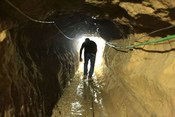
Three workmen were reported missing on Monday evening after the tunnel they were inside in Rafah border area was destroyed by the Egyptian army, according to a Palestinian security source in Gaza.
The security source told Anadolu news agency, on condition of anonymity, that three Palestinians aged between 24 and 25 were carrying out maintenance work inside a tunnel in a border area between Gaza and Egypt when the Egyptian army detonated it with no prior notice.
The Egyptian authorities started about a month ago to flood the border with Gaza with seawater in order to destroy all the underground tunnels used by the Gazans to smuggle goods and vital needs into their besieged enclave.
The security source told Anadolu news agency, on condition of anonymity, that three Palestinians aged between 24 and 25 were carrying out maintenance work inside a tunnel in a border area between Gaza and Egypt when the Egyptian army detonated it with no prior notice.
The Egyptian authorities started about a month ago to flood the border with Gaza with seawater in order to destroy all the underground tunnels used by the Gazans to smuggle goods and vital needs into their besieged enclave.
9 oct 2015
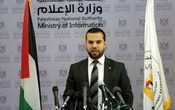
Palestinian Ministry of Interior in Gaza said there are big difficulties in securing borders with Egypt after being flooded by sea water.
In a press conference on Thursday, the Ministry said flooding the border by Egypt is a destructive project which is not justified at all.
The ministry called for halting the project which will aggravate the miserable humanitarian conditions in the blockaded coastal enclave.
It called on international and human rights organizations to work on solving this crisis and sent letters to the Arab League, United Nations and Egyptian authorities to stop flooding Gaza border with sea water for its great danger to the people of the Gaza Strip.
After the passage of three weeks of pumping water, the effects started to be noticed. Strong landslides and cracks of homes at the borderline with Egypt have been seen. This warns of the collapse of border houses in addition to great damage of the sites of Palestinian National Security Forces along the southern border.
In a press conference on Thursday, the Ministry said flooding the border by Egypt is a destructive project which is not justified at all.
The ministry called for halting the project which will aggravate the miserable humanitarian conditions in the blockaded coastal enclave.
It called on international and human rights organizations to work on solving this crisis and sent letters to the Arab League, United Nations and Egyptian authorities to stop flooding Gaza border with sea water for its great danger to the people of the Gaza Strip.
After the passage of three weeks of pumping water, the effects started to be noticed. Strong landslides and cracks of homes at the borderline with Egypt have been seen. This warns of the collapse of border houses in addition to great damage of the sites of Palestinian National Security Forces along the southern border.
7 oct 2015
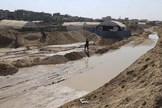
Rafah Mayor, Subhi Redwan, warned Tuesday of the serious repercussions of an underway seawater-filled moat built by the Egyptian authorities along the borders with Gaza.
Redwan said during a meeting in Rafah’s Municipality that the saltwater moat is a chain in the series of disasters successively inflicted on Gaza’s southern province.
He said the Egyptian project will seriously affect Rafah’s ecosystem and demographic character.
“We will most probably be compelled to evacuate homes along the border fence so as to protect the lives of the inhabitants, who will be shocked soon as they catch sight of their own and only agricultural lands and properties falling apart,” the official said.
He warned of the serious upshots of the underway high-salinity moat on Gaza’s infrastructure and vital amenities, including sewage services and water drainage.
The Rafah Mayor called on the Egyptian authorities to backtrack on such a dangerous project due to the threats it poses to lives of Palestinians setting up roots along the Gaza-Egypt borders, along with the enclave’s fauna and flora.
In what observers branded an unprecedented move set to please the Israeli occupation, the Egyptian army forces have begun to pump water from the Mediterranean Sea into underground tunnels on the southern borders of the besieged Gaza Strip.
Blockaded by the Israeli regime since 2007, Gaza used to receive urgently-needed supplies through the network of underground tunnels on its border with Egypt's Sinai Peninsula.
Palestinians in Gaza are living under inhuman conditions due to the tough siege imposed by the Israeli occupation and also due to Egypt’s quasi-permanent closure of the Rafah border-crossing.
Redwan said during a meeting in Rafah’s Municipality that the saltwater moat is a chain in the series of disasters successively inflicted on Gaza’s southern province.
He said the Egyptian project will seriously affect Rafah’s ecosystem and demographic character.
“We will most probably be compelled to evacuate homes along the border fence so as to protect the lives of the inhabitants, who will be shocked soon as they catch sight of their own and only agricultural lands and properties falling apart,” the official said.
He warned of the serious upshots of the underway high-salinity moat on Gaza’s infrastructure and vital amenities, including sewage services and water drainage.
The Rafah Mayor called on the Egyptian authorities to backtrack on such a dangerous project due to the threats it poses to lives of Palestinians setting up roots along the Gaza-Egypt borders, along with the enclave’s fauna and flora.
In what observers branded an unprecedented move set to please the Israeli occupation, the Egyptian army forces have begun to pump water from the Mediterranean Sea into underground tunnels on the southern borders of the besieged Gaza Strip.
Blockaded by the Israeli regime since 2007, Gaza used to receive urgently-needed supplies through the network of underground tunnels on its border with Egypt's Sinai Peninsula.
Palestinians in Gaza are living under inhuman conditions due to the tough siege imposed by the Israeli occupation and also due to Egypt’s quasi-permanent closure of the Rafah border-crossing.
2 oct 2015
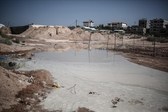
The Egyptian authorities have continued to flood the Gaza-Egypt borders with high-salinity seawater as part of intents to destroy cross-border tunnel activity, resulting in remarkable damage in Gaza’s fauna and flora.
Local sources told a PIC journalist that high-salinity sea water has been leaking into the Palestinian side of the border area after the Egyptian authorities stepped up pumping of seawater into Gaza’s border area in southern Rafah city.
The same sources added that the flooding project resulted in remarkable damage in Gaza’s fauna and flora, with large pools of seawater stacked one day after the other.
In what observers branded an unprecedented move set to please the Israeli occupation, the Egyptian army forces have begun, since September 11, to pump water from the Mediterranean Sea into underground tunnels on the southern borders of the besieged Gaza Strip, harming nearby civilian homes and cultivated land lots.
According to Gaza’s Water Authority, the move poses a serious threat to the Strip’s water and food security.
Blockaded by the Israeli regime since 2007, Gaza used to receive urgently-needed supplies through the network of underground tunnels on its border with Egypt's Sinai Peninsula.
Palestinians in Gaza are living under inhuman conditions due to the tough siege imposed by the Israeli occupation and also due to Egypt’s quasi-permanent closure of the Rafah border-crossing.
Local sources told a PIC journalist that high-salinity sea water has been leaking into the Palestinian side of the border area after the Egyptian authorities stepped up pumping of seawater into Gaza’s border area in southern Rafah city.
The same sources added that the flooding project resulted in remarkable damage in Gaza’s fauna and flora, with large pools of seawater stacked one day after the other.
In what observers branded an unprecedented move set to please the Israeli occupation, the Egyptian army forces have begun, since September 11, to pump water from the Mediterranean Sea into underground tunnels on the southern borders of the besieged Gaza Strip, harming nearby civilian homes and cultivated land lots.
According to Gaza’s Water Authority, the move poses a serious threat to the Strip’s water and food security.
Blockaded by the Israeli regime since 2007, Gaza used to receive urgently-needed supplies through the network of underground tunnels on its border with Egypt's Sinai Peninsula.
Palestinians in Gaza are living under inhuman conditions due to the tough siege imposed by the Israeli occupation and also due to Egypt’s quasi-permanent closure of the Rafah border-crossing.
29 sept 2015
Bardawil: Flooding Gaza tunnels painful blow, but not fatal
Hamas leader Salah Bardawil said that tightening the siege on Gaza Strip and flooding its tunnels with seawater constituted a painful blow for the Palestinian people, but not a fatal one.
In press statements on Monday, Bardawil stressed that the Egyptian recent measures along Gaza-Egypt borders will only serve the Israeli occupation.
The idea of flooding Gaza tunnels was first submitted by PA Chairman Mahmoud Abbas to Egypt after being accompanied with a media incitement campaign aiming to tighten siege on Gaza people and resistance, he charged.
All these plots did not and will never succeed to tighten the noose around Palestinian resistance, Hamas senior official stressed.
Bardawil’s statements came after the Egyptian president Abdel Fattah al-Sisi on Saturday said that the security measures taken by his country along the border with Gaza were taken in full coordination with the Palestinian Authority.
28 sept 2015
"Sisi's sea"... part of Israeli scheme to turn Gaza into an island (report)
"Sisi’s sea" as referred to by activists on social network pages in their talk about the waterway that the Egyptian military is digging on the borders with Gaza Strip, is not an "Egyptian-planned sea"; basically, it is the first part of an old Israeli scheme to turn Gaza into a "hostile island", separating it geographically and isolating it in the middle of water.
Implementing this scheme on the ground, however, was postponed several times without obvious reasons.
It was found in the archive of 2004 of "Yediot Ahronot" Hebrew newspaper that the Israeli Ministry of War has announced a tender between companies on the project of drilling a buffering-water canal along the border with Egypt or the so-called Philadelphia line, to meet the security assessments that pointed at the time to the accelerated pace of smuggling weapons from Sinai and to the increasing security risks in the long term because of that, and to the risk of digging more tunnels if the borders remained open.
The newspaper quoted Israeli officials as saying that the canal to be dug stretches 4 kilometers long and ranges between 15 to 25 meters depth. But implementing the canal will put financial burdens on the state treasury and will cause many security risks during the implementation of the project. Therefore; there must be teams from the Israeli army allocated to follow up the work and to keep the Israeli companies working on the project safe, the paper added.
Israeli scheme
Hence it is clear that the current Egyptian project is only part of the Israeli scheme that was postponed until finding an "ally" from the Egyptian authority to bear the burden. But the Zionist project is not limited to isolate Gaza from Egypt only; it also extends to the border between the Gaza Strip and the occupied Palestinian territories in 1948.
In this context; "The Marker", an economic Hebrew newspaper, confirmed in a report in July 2014 that the Israeli Ministry of War had completed a comprehensive scheme on the project since 2001, developed by a number of experts, including Professor Joseph Hazor, head of the geology department at Ben-Gurion University and his colleague, Professor Haim Gabritzmann, hydrology expert at the Hebrew University in Jerusalem.
The scheme developed by experts was described as 100% effective as it guarantees the removal of potential threat of tunnels between Gaza and the 1948 occupied territories and between Egypt and Gaza.
The researchers conducted studies and experiments in the areas to the south of 1958 occupied Palestine for more than 4 years costing the Department of Army more than 300,000 dollars. As a result they have founded a mechanism to drench the tunnels with groundwater which guarantees that any future tunnels will collapse by themselves. The experiments claimed a 90% success rate.
The tunnels used in the last war on Gaza revived the project
In spite of the fact that the Israeli security services are aware of the existence of tunnels between Gaza Strip and the Egyptian borders, yet they put the project on hold, until the last war broke out against the Gaza Strip in the summer of 2014 in which the Israeli occupation army was astounded by the huge number of tunnels the Palestinian resistance had used, resulting in many moral and material damage and loss of life in the Israeli military ranks.
Israel then began to study the project anew, and it seemed that there were communications with the Egyptian authority to cooperate in implementing the project.
After less than two months of the end of the last Israeli aggression on Gaza, the Egyptian president Abdel Fattah Sisi announced the beginning of implementing a scheme of "hollowing out" the population of the Egyptian city of Rafah, a prelude to the establishment of the buffer zone, which includes the water canal that ensures separating Gaza from the Egyptian Rafah city.
Here a question arises: Will Israel carry out its part of the scheme and turn Gaza into an island?
27 sept 2015
Egypt’s Sissi: Gaza borders flooded in coordination with PA
Egypt’s president Abdel Fattah al-Sissi on Saturday claimed the flooding of borders with Gaza by Egyptian army forces was carried out in coordination with the Palestinian Authority (PA).
“The measures taken by Egypt to secure its eastern borders are in full coordination with the Palestinian Authority and cannot have the aim of harming our Palestinian brothers in the Gaza Strip,” al-Sissi was quoted as claiming in a statement released by his office.
The measures seek to protect the Egyptian borders and maintain Egyptian and Palestinian national security,” he further alleged.
The Egyptian president reportedly made the comments during a meeting with PA President Mahmoud Abbas in New York, where they are attending the United Nations General Assembly.
In what observers branded an unprecedented move set to please the Israeli occupation, the Egyptian army forces have begun to pump water from the Mediterranean Sea into underground tunnels on the southern borders of the besieged Gaza Strip.
Blockaded by the Israeli regime since 2007, Gaza used to receive urgently-needed supplies through the network of underground tunnels on its border with Egypt's Sinai Peninsula.
Palestinians in Gaza are living under inhuman conditions due to the tough siege imposed by the Israeli occupation and also due to al-Sissi’s quasi-permanent closure of the Rafah border-crossing.
Egypt began creating a wide buffer zone along the Gaza border in late 2014 in a bid to destroy the hundreds of tunnels used by Palestinians in the besieged coastal enclave.
Hamas: Sissi’s statements prove PA’s conspiracy against Gaza
Islamic Resistance Movement, Hamas, said Egyptian President Abdel Fattah al-Sissi’s statements on full coordination with the Palestinian Authority (PA) in the measures taken by Egypt to secure its eastern borders prove the conspiracy led by Palestinian President Mahmoud Abbas against Gaza Strip.
In a press statement on Sunday, Hamas spokesman Sami Abu Zuhri said Egyptian President Abdel Fattah al-Sissi’s statements, stating that the flooding of borders with Gaza by Egyptian army forces was carried out in full coordination with the Palestinian Authority, constitute a clear proof of PA’s conspiracy led by Abbas against Gaza.
Hamas called for “taking a national position against Abbas’s practices which brought in disasters into Gaza”.
The Egyptian president reportedly made the comments during a meeting with Abbas in New York, where they were attending the United Nations General Assembly.
Sissi asserted that border crossings with Gaza will not be opened unless they are taken over by the PA, which raises questions about the vision of Egypt and the PA in dealing with the Strip in the coming days.
23 sept 2015
Bardawil: Flooding Gaza tunnels painful blow, but not fatal
Hamas leader Salah Bardawil said that tightening the siege on Gaza Strip and flooding its tunnels with seawater constituted a painful blow for the Palestinian people, but not a fatal one.
In press statements on Monday, Bardawil stressed that the Egyptian recent measures along Gaza-Egypt borders will only serve the Israeli occupation.
The idea of flooding Gaza tunnels was first submitted by PA Chairman Mahmoud Abbas to Egypt after being accompanied with a media incitement campaign aiming to tighten siege on Gaza people and resistance, he charged.
All these plots did not and will never succeed to tighten the noose around Palestinian resistance, Hamas senior official stressed.
Bardawil’s statements came after the Egyptian president Abdel Fattah al-Sisi on Saturday said that the security measures taken by his country along the border with Gaza were taken in full coordination with the Palestinian Authority.
28 sept 2015
"Sisi's sea"... part of Israeli scheme to turn Gaza into an island (report)
"Sisi’s sea" as referred to by activists on social network pages in their talk about the waterway that the Egyptian military is digging on the borders with Gaza Strip, is not an "Egyptian-planned sea"; basically, it is the first part of an old Israeli scheme to turn Gaza into a "hostile island", separating it geographically and isolating it in the middle of water.
Implementing this scheme on the ground, however, was postponed several times without obvious reasons.
It was found in the archive of 2004 of "Yediot Ahronot" Hebrew newspaper that the Israeli Ministry of War has announced a tender between companies on the project of drilling a buffering-water canal along the border with Egypt or the so-called Philadelphia line, to meet the security assessments that pointed at the time to the accelerated pace of smuggling weapons from Sinai and to the increasing security risks in the long term because of that, and to the risk of digging more tunnels if the borders remained open.
The newspaper quoted Israeli officials as saying that the canal to be dug stretches 4 kilometers long and ranges between 15 to 25 meters depth. But implementing the canal will put financial burdens on the state treasury and will cause many security risks during the implementation of the project. Therefore; there must be teams from the Israeli army allocated to follow up the work and to keep the Israeli companies working on the project safe, the paper added.
Israeli scheme
Hence it is clear that the current Egyptian project is only part of the Israeli scheme that was postponed until finding an "ally" from the Egyptian authority to bear the burden. But the Zionist project is not limited to isolate Gaza from Egypt only; it also extends to the border between the Gaza Strip and the occupied Palestinian territories in 1948.
In this context; "The Marker", an economic Hebrew newspaper, confirmed in a report in July 2014 that the Israeli Ministry of War had completed a comprehensive scheme on the project since 2001, developed by a number of experts, including Professor Joseph Hazor, head of the geology department at Ben-Gurion University and his colleague, Professor Haim Gabritzmann, hydrology expert at the Hebrew University in Jerusalem.
The scheme developed by experts was described as 100% effective as it guarantees the removal of potential threat of tunnels between Gaza and the 1948 occupied territories and between Egypt and Gaza.
The researchers conducted studies and experiments in the areas to the south of 1958 occupied Palestine for more than 4 years costing the Department of Army more than 300,000 dollars. As a result they have founded a mechanism to drench the tunnels with groundwater which guarantees that any future tunnels will collapse by themselves. The experiments claimed a 90% success rate.
The tunnels used in the last war on Gaza revived the project
In spite of the fact that the Israeli security services are aware of the existence of tunnels between Gaza Strip and the Egyptian borders, yet they put the project on hold, until the last war broke out against the Gaza Strip in the summer of 2014 in which the Israeli occupation army was astounded by the huge number of tunnels the Palestinian resistance had used, resulting in many moral and material damage and loss of life in the Israeli military ranks.
Israel then began to study the project anew, and it seemed that there were communications with the Egyptian authority to cooperate in implementing the project.
After less than two months of the end of the last Israeli aggression on Gaza, the Egyptian president Abdel Fattah Sisi announced the beginning of implementing a scheme of "hollowing out" the population of the Egyptian city of Rafah, a prelude to the establishment of the buffer zone, which includes the water canal that ensures separating Gaza from the Egyptian Rafah city.
Here a question arises: Will Israel carry out its part of the scheme and turn Gaza into an island?
27 sept 2015
Egypt’s Sissi: Gaza borders flooded in coordination with PA
Egypt’s president Abdel Fattah al-Sissi on Saturday claimed the flooding of borders with Gaza by Egyptian army forces was carried out in coordination with the Palestinian Authority (PA).
“The measures taken by Egypt to secure its eastern borders are in full coordination with the Palestinian Authority and cannot have the aim of harming our Palestinian brothers in the Gaza Strip,” al-Sissi was quoted as claiming in a statement released by his office.
The measures seek to protect the Egyptian borders and maintain Egyptian and Palestinian national security,” he further alleged.
The Egyptian president reportedly made the comments during a meeting with PA President Mahmoud Abbas in New York, where they are attending the United Nations General Assembly.
In what observers branded an unprecedented move set to please the Israeli occupation, the Egyptian army forces have begun to pump water from the Mediterranean Sea into underground tunnels on the southern borders of the besieged Gaza Strip.
Blockaded by the Israeli regime since 2007, Gaza used to receive urgently-needed supplies through the network of underground tunnels on its border with Egypt's Sinai Peninsula.
Palestinians in Gaza are living under inhuman conditions due to the tough siege imposed by the Israeli occupation and also due to al-Sissi’s quasi-permanent closure of the Rafah border-crossing.
Egypt began creating a wide buffer zone along the Gaza border in late 2014 in a bid to destroy the hundreds of tunnels used by Palestinians in the besieged coastal enclave.
Hamas: Sissi’s statements prove PA’s conspiracy against Gaza
Islamic Resistance Movement, Hamas, said Egyptian President Abdel Fattah al-Sissi’s statements on full coordination with the Palestinian Authority (PA) in the measures taken by Egypt to secure its eastern borders prove the conspiracy led by Palestinian President Mahmoud Abbas against Gaza Strip.
In a press statement on Sunday, Hamas spokesman Sami Abu Zuhri said Egyptian President Abdel Fattah al-Sissi’s statements, stating that the flooding of borders with Gaza by Egyptian army forces was carried out in full coordination with the Palestinian Authority, constitute a clear proof of PA’s conspiracy led by Abbas against Gaza.
Hamas called for “taking a national position against Abbas’s practices which brought in disasters into Gaza”.
The Egyptian president reportedly made the comments during a meeting with Abbas in New York, where they were attending the United Nations General Assembly.
Sissi asserted that border crossings with Gaza will not be opened unless they are taken over by the PA, which raises questions about the vision of Egypt and the PA in dealing with the Strip in the coming days.
23 sept 2015

Dozens of Palestinians have participated Tuesday in a protest vigil, organized by Hamas movement in Rafah to the south of Gaza Strip, demanding the release of four Palestinians who were kidnapped last month in the Egyptian area of Rafah.
The participants held banners, during the vigil, condemning the incident and calling on the Egyptian authorities to act urgently for their release.
In his speech during the event, the leader in Hamas Movement Issa al-Nashar held the Egyptian authorities fully responsible for the abduction of the four Palestinian youths as “they were kidnapped in Egyptian territories while being in the deportation bus under the protection of Egyptian security forces.”
"We will make all possible efforts till their safe return to their families", he said.
In their turn, families of the four kidnapped passengers called on PA Chairman Mahmoud Abbas, the Red Cross, and all the free world to intervene immediately for the release of their sons.
On August 19, four Palestinian passengers were kidnapped as they were en route from Rafah border crossing to Cairo airport aboard an Egyptian deportation bus.
Spokesman for the interior ministry Iyad al-Bazem affirmed shortly after the incident that gunmen intercepted the deportation bus in the Egyptian area of Rafah and took the Palestinians to an unknown destination.
The participants held banners, during the vigil, condemning the incident and calling on the Egyptian authorities to act urgently for their release.
In his speech during the event, the leader in Hamas Movement Issa al-Nashar held the Egyptian authorities fully responsible for the abduction of the four Palestinian youths as “they were kidnapped in Egyptian territories while being in the deportation bus under the protection of Egyptian security forces.”
"We will make all possible efforts till their safe return to their families", he said.
In their turn, families of the four kidnapped passengers called on PA Chairman Mahmoud Abbas, the Red Cross, and all the free world to intervene immediately for the release of their sons.
On August 19, four Palestinian passengers were kidnapped as they were en route from Rafah border crossing to Cairo airport aboard an Egyptian deportation bus.
Spokesman for the interior ministry Iyad al-Bazem affirmed shortly after the incident that gunmen intercepted the deportation bus in the Egyptian area of Rafah and took the Palestinians to an unknown destination.
21 sept 2015
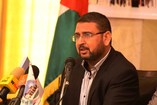
The Hamas Movement has said it has started conducting contacts with the Egyptian authorities to stop them from pumping water from the Mediterranean Sea into the Palestinian border areas in the Gaza Strip.
Hamas spokesman Sami Abu Zuhri stated on Sunday that contacts were underway with Cairo to halt pumping seawater into Rafah, expressing his Movement's hope that such "objectionable" measure would stop immediately.
Abu Zuhri underlined that the creation of saltwater swamps along the Palestinian border with Egypt would be posing a great danger to the aquifer and homes in Gaza.
The Egyptian army started at dawn Friday to flood the Palestinian side of Rafah in Gaza with considerable amounts of seawater at the pretext of destroying tunnels.
The network of tunnels is a vital lifeline for the population in the blockaded enclave of Gaza, through which all vital goods and needs trickle in.
Hamas spokesman Sami Abu Zuhri stated on Sunday that contacts were underway with Cairo to halt pumping seawater into Rafah, expressing his Movement's hope that such "objectionable" measure would stop immediately.
Abu Zuhri underlined that the creation of saltwater swamps along the Palestinian border with Egypt would be posing a great danger to the aquifer and homes in Gaza.
The Egyptian army started at dawn Friday to flood the Palestinian side of Rafah in Gaza with considerable amounts of seawater at the pretext of destroying tunnels.
The network of tunnels is a vital lifeline for the population in the blockaded enclave of Gaza, through which all vital goods and needs trickle in.

Israel’s leadership of army staff praised the Egyptian coup authorities for flooding the Egypt-Gaza borders with seawater.
The occupation army staff acclaimed the flooding project carried out by the Egyptian authorities as part of intents to destroy cross-border tunnel activity, saying: “Such a service is just priceless.”
In what observers branded an unprecedented move set to please the Israeli occupation, the Egyptian army forces have begun to pump water from the Mediterranean Sea into underground tunnels on the southern borders of the besieged Gaza Strip.
The Water Authority in the blockaded Gaza Strip warned Saturday of the serious repercussions of such a project, saying the high-salinity water is a threat to nearby civilian homes and cultivated land lots.
According to Gaza’s Water Authority, the move poses a serious threat to the Strip’s water and food security.
Blockaded by the Israeli regime since 2007, Gaza used to receive urgently-needed supplies through the network of underground tunnels on its border with Egypt's Sinai Peninsula.
Palestinians in Gaza are living under inhuman conditions due to the tough siege imposed by the Israeli occupation and also due to Egypt’s quasi-permanent closure of the Rafah border-crossing.
The occupation army staff acclaimed the flooding project carried out by the Egyptian authorities as part of intents to destroy cross-border tunnel activity, saying: “Such a service is just priceless.”
In what observers branded an unprecedented move set to please the Israeli occupation, the Egyptian army forces have begun to pump water from the Mediterranean Sea into underground tunnels on the southern borders of the besieged Gaza Strip.
The Water Authority in the blockaded Gaza Strip warned Saturday of the serious repercussions of such a project, saying the high-salinity water is a threat to nearby civilian homes and cultivated land lots.
According to Gaza’s Water Authority, the move poses a serious threat to the Strip’s water and food security.
Blockaded by the Israeli regime since 2007, Gaza used to receive urgently-needed supplies through the network of underground tunnels on its border with Egypt's Sinai Peninsula.
Palestinians in Gaza are living under inhuman conditions due to the tough siege imposed by the Israeli occupation and also due to Egypt’s quasi-permanent closure of the Rafah border-crossing.
20 sept 2015
|
|
The Water Authority in the blockaded Gaza Strip warned Saturday of the serious repercussions of an underway Egyptian project flooding the Egypt-Gaza border with seawater in an attempt to destroy cross-border tunnel activity.
A statement by Gaza’s Water Authority said the high-salinity water is a threat to nearby civilian homes and cultivated land lots. According to Gaza’s Water Authority, the move poses a serious threat to the Strip’s water and food security. In what observers branded an unprecedented move set to please the Israeli occupation, the Egyptian army forces have begun to pump water from the Mediterranean Sea into underground tunnels on the southern borders of the besieged Gaza Strip. |
Blockaded by the Israeli regime since 2007, Gaza used to receive urgently-needed supplies through the network of underground tunnels on its border with Egypt's Sinai Peninsula.
Palestinians in Gaza are living under inhuman conditions due to the tough siege imposed by the Israeli occupation and also due to Egypt’s quasi-permanent closure of the Rafah border-crossing.
Palestinians in Gaza are living under inhuman conditions due to the tough siege imposed by the Israeli occupation and also due to Egypt’s quasi-permanent closure of the Rafah border-crossing.
